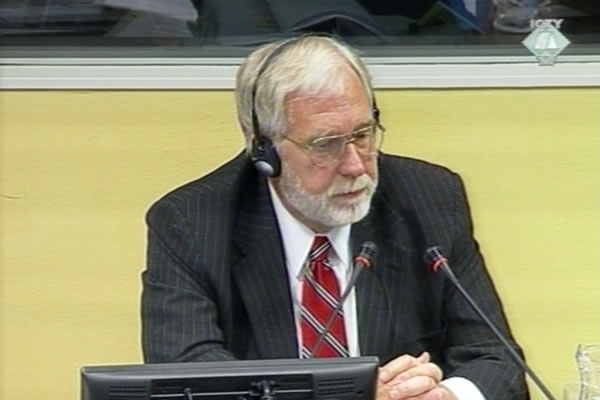Home
WHO STARTED FIRST?
The defense of Mico Stanisic and Stojan Zupljanin today cross-examined American historian Robert Donia, putting it to him that Bosnian Muslims and Croats were the first to implement the idea of independence, a long time before the Bosnian Serbs did. To prove their claims, they brought up Alija Izetbegovic’s Islamic Declaration and a fax message sent to Mate Boban
 Robert Donia, witness at the Mico Stanisic and Stojan Zupljanin trial
Robert Donia, witness at the Mico Stanisic and Stojan Zupljanin trial Historian Robert Donia, the first prosecution witness at the trial of former Bosnian Serb police officials Mico Stanisic and Stojan Zupljanin, returned to court today to complete his testimony. Donia’s cross-examination started in September 2009, but had to be interrupted because of the witness’s professional obligations. In his examination-in chief, Donia testified about the political preparations for the creation of an ethnically clean Serb state within BH and on the role the police played in that process. The Serbian Democratic Party started working on uniting Serb municipalities throughout Bosnia as early as in 1990, Donia had said. The goal, Donia noted, was to carve up the country and pre-empt the independence advocated by Bosnian Muslims and Croats.
In the cross-examination today, Mico Stanisic’s defense lawyer argued that the Croatian entity in BH – the so-called Croatian Community Herceg Bosna – had in fact existed for more than a year before it was formally declared on 18 November 1991. The defense counsel showed a series of documents faxed to the HZ HB president Mate Boban. The dates on documents showed that they were written in 1990, Cvijetic claimed. Donia replied that the dates on the documents were wrong, because the fax machine used to send them was ‘not properly set’. The defense counsel went on to argue that the BH laws applied only if they did not contravene Herceg Bosnia decrees. According to the defense, this indicates that the Croatian entity had ‘elements of statehood’. He also noted that the HR HB continued to exist until 1998. The witness agreed with the defense, adding that HR HB existed as an ‘illegal’ entity, violating the provisions of the Dayton peace agreement.
At the end of the cross-examination, Stanisic’s defense counsel noted that the witness had signed an open letter to the presidents of the International Court of Justice and the ICTY, saying that the judgment in the BH vs. FRY case was ‘bad’ and ‘proof the politics interfered in the working of the court’. The fact that the witness signed this letter indicated that his ‘expert report is biased’, the defense counsel argued, because he took sides in the conflict. His expert report should therefore be rejected, the defense counsel argued.
As Donia’s cross-examination drew to a close, Stojan Zupljanin’s defense lawyer also claimed that Donia was a ‘fighter for the Muslim cause’, ‘close to the Bosnian Muslim regime’ and that his report ‘was biased’. ‘I simply don’t agree with that’, Donia replied. Zupljanin’s defense lawyer tried to prove that Alija Izetbegovic used his Islamic Declaration as a basis for SDA policy in Bosnia. According to Zupljanin’s defense, Izetbegovic’s goal was to Islamise BH. Donia didn’t agree with the defense’s suggestion. The Islamic Declaration was written in 1970’s and could not be applied to the events that happened twenty years later.
Linked Reports
- Case : Zupljanin i Stanisic - "Bosnia and Herzegovina"
- 2009-12-15 ‘PICTURE OF A SAD SITUATION’
- 2009-11-16 WITNESS: THE ARMY ARRESTED PEOPLE, POLICE INTERVIEWED THEM
- 2009-11-10 STOJAN ZUPLJANIN’S ‘STANDING’ PROTEST
- 2010-01-21 MANJACA – HOUSE OF TERROR
- 2010-01-22 FIVE DEAD IN THE ‘DEATH CAMP’
- 2010-01-28 PROFESSIONALISM AS A CONSPIRACY AGAINST SERBIA
